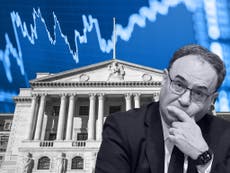What do new mortgage measures announced by Jeremy Hunt mean for struggling borrowers?
Extra help has been announced for struggling mortgage borrowers after crunch meeting between Jeremy Hunt and major banks
Your support helps us to tell the story
From reproductive rights to climate change to Big Tech, The Independent is on the ground when the story is developing. Whether it's investigating the financials of Elon Musk's pro-Trump PAC or producing our latest documentary, 'The A Word', which shines a light on the American women fighting for reproductive rights, we know how important it is to parse out the facts from the messaging.
At such a critical moment in US history, we need reporters on the ground. Your donation allows us to keep sending journalists to speak to both sides of the story.
The Independent is trusted by Americans across the entire political spectrum. And unlike many other quality news outlets, we choose not to lock Americans out of our reporting and analysis with paywalls. We believe quality journalism should be available to everyone, paid for by those who can afford it.
Your support makes all the difference.Under-pressure mortgage borrowers have been offered some potential relief as Chancellor Jeremy Hunt and major banks agreed measures on Friday to help ease the pain of rising rates.
Here is a look at what this means for people who are struggling with their mortgage payments:
What has happened?
Lenders representing over 75% of the market have agreed to a “mortgage charter”, providing support for residential mortgage customers.
Among the measures, borrowers will be able to switch to an interest-only mortgage for six months, or extend their mortgage term to reduce their monthly payments and switch back to their original term within the first six months, if they choose to.
Both options can be taken without a new affordability check or it affecting their credit score.
Lenders have also agreed to implementing a 12-month minimum period before repossessing homes.
Mr Hunt said measures will start taking effect within the next two weeks.

Who was at the meeting with Mr Hunt?
Alison Rose, Group CEO, NatWest; Debbie Crosbie, CEO, Nationwide Building Society; Matt Hammerstein, CEO, Barclays UK; Ian Stuart, CEO, HSBC UK; Mike Regnier, CEO, Santander UK; Charlie Nunn, Group CEO, Lloyds Banking Group; David Duffy, CEO, Virgin Money; and Nikhil Rathi, CEO of the Financial Conduct Authority (FCA).
– Why was the meeting called?
Rising mortgage rates have been fuelling concerns that more borrowers will struggle to absorb hefty mortgage hikes.
The average two-year fixed-rate mortgage recently broke through the 6% mark and the Bank of England hiked the base rate on Thursday from 4.5% to 5% – a steeper hike than some were expecting.
How are borrowers being affected by base rate rises?
Over 80% of homeowners are on fixed-rate deals and will be protected from any immediate rise in mortgage repayments.
However, around 2.4 million fixed-rate products are due to end between now and the end of 2024, meaning the mortgage pain will be dripped out over time.
People on tracker mortgages will immediately feel the impact from the base rate rises. Taking all 13 base rate rises into account, the average monthly tracker mortgage payment will have increased by £464.79 – adding up to average tracker mortgage payment increases of £5,577.48 annually, according to figures from UK Finance.
Is there more mortgage pain to come?
Financial markets have predicted that interest rates will strike a high of 6% by early next year.
So why has the Bank of England continued to hike the base rate?
The Bank is using rate rises as a tool to try to subdue stubbornly high inflation.
It has a target to try to get the rate of inflation to around 2%.
Consumer Prices Index (CPI) inflation remained at 8.7% in May, despite hopes that it would fall and provide some relief for households.
Will there be a cash support package for struggling borrowers?
Mr Hunt has resisted some calls to offer a major support package to mortgage holders, fearing it could further fuel inflation.
What have other political parties said?
Liberal Democrat Treasury spokesperson Sarah Olney said: “This is a sticking plaster for a gushing wound.”
The Scottish National Party criticised the measures announced by the Chancellor as “paper thin”.
Shadow chancellor Rachel Reeves accused the Government of a “weak” reaction to the mortgage crisis.
This is a sticking plaster for a gushing wound
How can borrowers coming to the end of a fixed-rate deal prepare generally?
Karen Noye, a mortgage expert at Quilter, said: “As interest rates rise, it is crucial for borrowers to evaluate their mortgage deals and consider taking action before fixed-rate agreements expire.
“Engaging with mortgage brokers or lenders well in advance of the expiration date can help secure favourable deals and mitigate the impact of rising rates.”
What proportion of mortgage balances have already been in arrears?
The Treasury says figures from the industry and regulator indicate that mortgage arrears and defaults remain below pre-pandemic levels, which were already low.
It said the Financial Conduct Authority (FCA) reported 0.86% of total residential mortgage balances in arrears in the first quarter of 2023 which is significantly lower than a rate of 3.32% seen in 2009.
The average homeowner re-mortgaging over the past year had around a 50% loan-to-value ratio.




